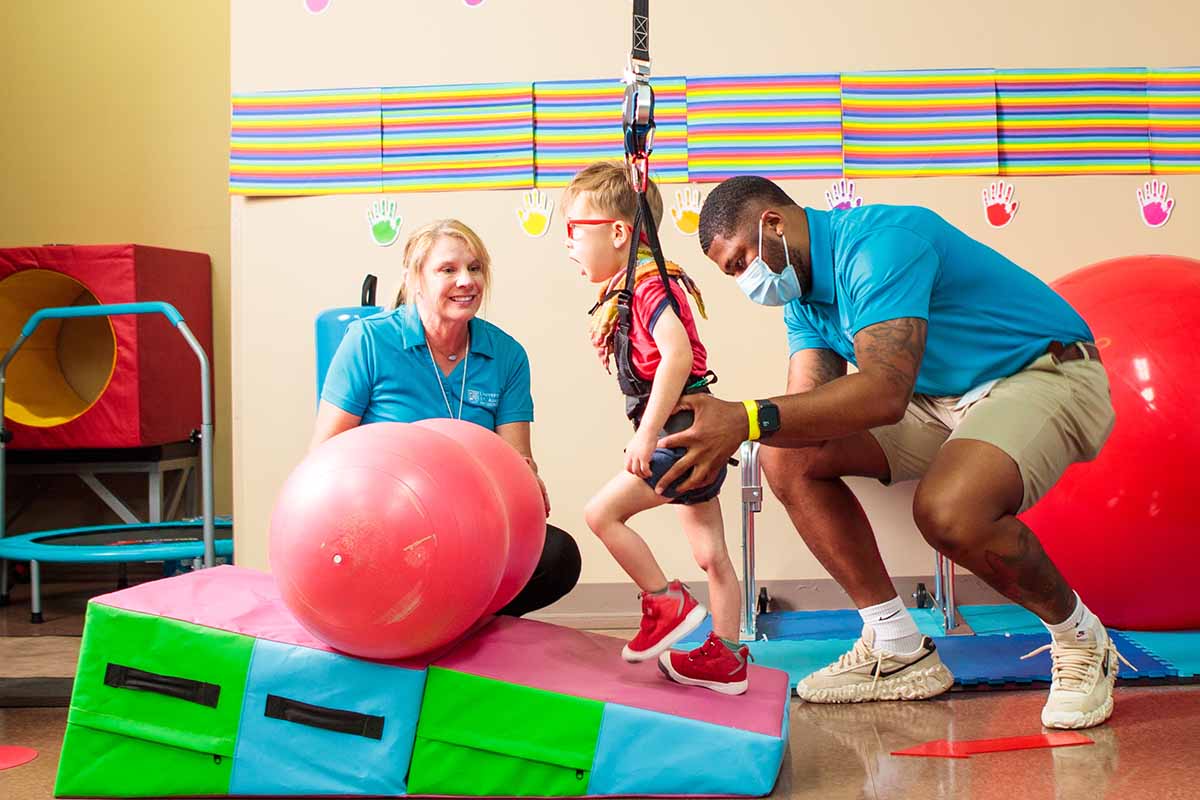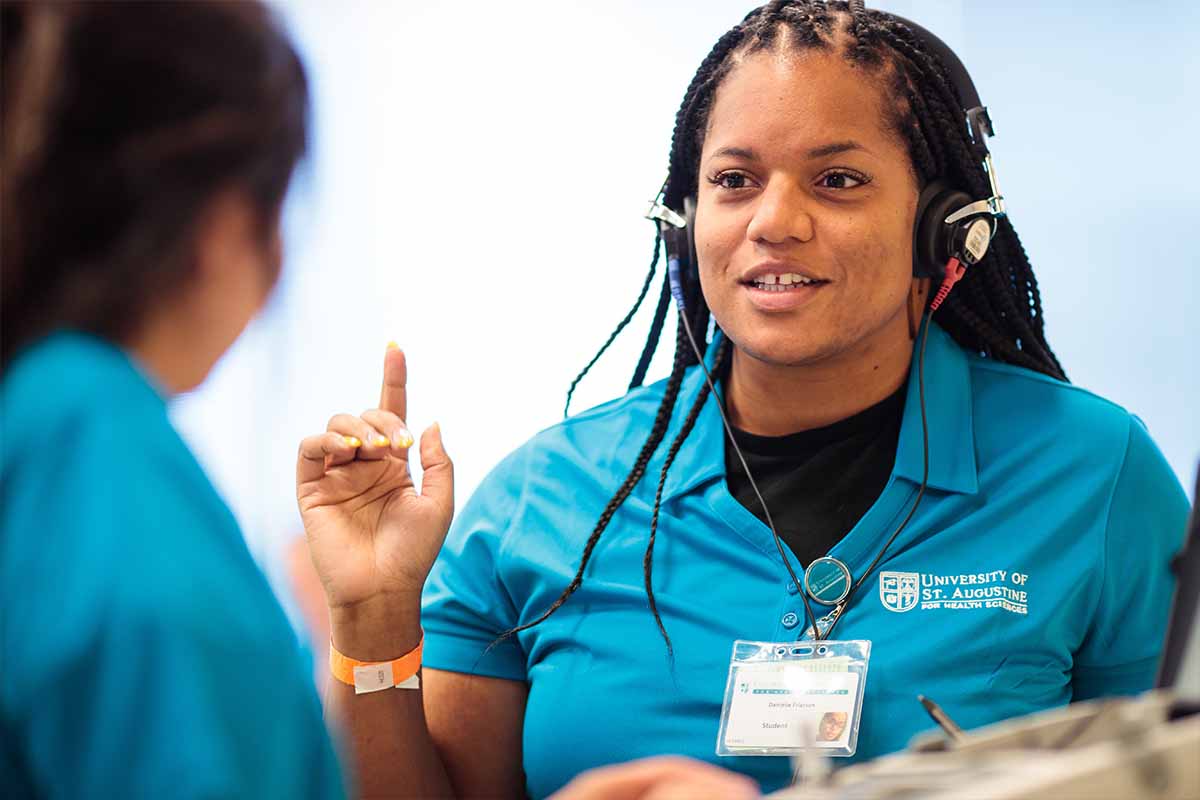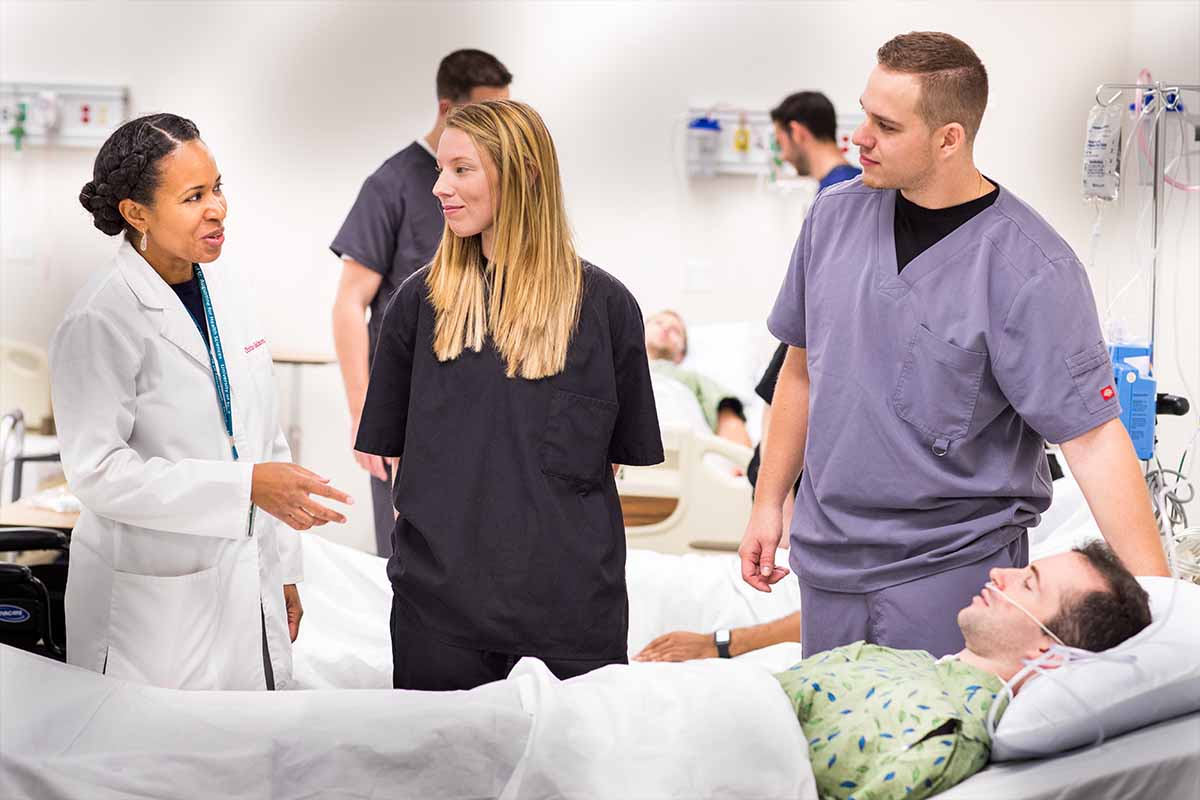

Shayna, Colton, and their dog Zura
When MS-SLP student Shayna Conner met Colton DeLoach at the place where she bartends part-time, she observed that he stutters occasionally. “I noticed, but it seemed natural,” she says.
“I thought, ‘She’ll get me,’” DeLoach remembers. “It’s comfortable to know that she understands it. She’s going to school for it.”
“At first, I was worried that talking about it would psych him out,” Conner says. “But it brings us together a little bit.”
The couple are engaged and are planning their wedding for the fall of 2023, after Conner graduates from the Master of Science in Speech-Language Pathology (MS-SLP) program that spring. They live in Akron, Ohio, where DeLoach works in a steel fabrication shop; Conner studies speech online and travels to the Austin campus for residencies.
“Colt’s speech is very fluent,” she explains. “Most people wouldn’t notice that he stutters. However, I notice him avoiding certain situations, like talking on the phone or ordering when we go out to eat. Or he might start a sentence, then start over and totally change what he was saying. He will experience blocking from time to time, mostly in emotional or unfamiliar situations.” (Blocking is the temporary inability to utter a word.)
DeLoach did have a severe stutter as a child that he has since outgrown. He also had some issues with vowels and the letter “R.” Starting in second grade, he went to speech class with a small group of his peers. “It helped me with the Rs,” he says. “It didn’t really help with my stutter.”
“They Just Take Longer to Get Their Words Out.”


Robyn Martin, MS, CCC-SLP, BCS-F
“Stuttering doesn’t go away,” says Robyn Martin, MS, CCC-SLP, BCS-F, Director of SLP Clinical Education for USAHS. “There is no cure. We know where in the brain it’s happening, but we don’t know why, and there is typically a genetic component.”
Growing up, DeLoach’s brother stuttered too, mostly at the start of sentences; this got better for a while, but came back. Their grandmother also stutters. “It’s kind of an unspoken thing between us,” DeLoach says.
Martin says that 1% of the population stutters, with a 4:1 ratio of more males than females. Speech and language delays are risk factors, as are anxiety and depression, although the relationship isn’t necessarily causal.
“A lot of people who stutter are very smart, not delayed—and they haven’t had an injury or stroke,” she said. “They just take longer to get their words out.”
Martin teaches fluency disorders during the MS-SLP program’s in-person residencies. Based on the Dallas campus, she’s one of only eight SLPs in Texas who is board-certified as a fluency specialist. She’s also the current President of the Texas Speech-Language Hearing Association, and she serves on ASHA’s Committee on Leadership Cultivation.
The Iceberg
She says that some kids who stutter can be made fun of and bullied—which can make the stuttering worse.
In 1970, clinical psychologist Joseph Sheehan wrote that the behavioral aspect of stuttering is just the tip of the iceberg, while the emotional aspect is the ice underneath the surface. He categorized these submerged emotions as fear, denial, shame, anxiety, isolation, guilt and hopelessness. The iceberg metaphor is still used in pedagogy about stuttering today.
DeLoach says that when he was growing up, kids would laugh at him and mimic him, which impacted his social participation. “People get impatient,” he says. “They’ll start looking at me differently, like I’m dumb.”
Martin says that when she works with clients who stutter, “some cancel their appointments; it’s very hard for clients to discuss these emotions related to their stuttering. The stuttering probably won’t go away. So what does effective communication look like for them? Sometimes, it’s just about being more okay with it.” She says she sees a positive shift once clients are ready to talk about the emotional impact of stuttering. It’s important for those who stutter to not try to hide or deny it, but to meet it head-on, she says, often by bringing up the “elephant in the room.”
Training SLPs
Martin says that when she first started practicing as an SLP, she noticed that many of her colleagues were uncomfortable with stuttering.
“SLPs struggle because it’s so complex, and there is no cure. But there’s so much we can do to help. The most important thing is to listen to people who stutter and their stories.”
She started traveling around to public schools in her district, training SLPs in how to work with clients who stutter. Today, she conducts workshops and gives presentations for professionals at state conferences. During the MS-SLP residencies, Martin has students work through case studies together and participate in a Q&A with a panel of people who stutter. Students also may have the chance to work with people with fluency disorders in the SLP virtual pro bono clinic.


Shayna Conner, MS-SLP student, with fiance Colton DeLoach
Teamwork
Interested in biomechanics, Conner had wanted to be an engineer. But during undergrad, she saw a model of a cochlear implant that piqued her interest so much, she changed her major to speech.
She has just started the third-trimester course Fluency & Fluency Disorders with Dr. Stephanie Hughes. She shares what she’s learning with DeLoach. He bought her a mug with speech terms on it that he’d learned from their conversations about her classes.
DeLoach says he plans his sentences in advance. “I have to keep a tab on myself all the time, to override it. If you talk too fast and get ahead of yourself, you will stutter. So you speak as if you’re reading it.” No one taught him this technique; “that’s all me,” he says.
“At first I would get mad at him for wanting me to make phone calls,” Conner says. “I have more empathy now—but I know he can do it. I want to bring his confidence up, but I also can help him plan what to say. If he gets too anxious, I’ll do it. That’s teamwork!”
Resources
- The National Stuttering Association (NSA) brings hope and empowerment to children and adults who stutter, their families, and professionals, through support, education, advocacy, and research.
- The Stuttering Foundation: free online resources, services and support to those who stutter and their families, as well as support for research into the causes of stuttering.
- American Institute for Stuttering: offering expert speech therapy and community support for people of all ages who stutter.
- Stamma: A vibrant UK organization with resources and inspiration.
The University of St. Augustine for Health Sciences (USAHS) offers a Master of Science in Speech-Language Pathology (MS-SLP) program. Designed for working students, the MS-SLP is an online program with four required on-campus residencies on either the USAHS Austin or Dallas campus. The program offers two intakes per year, in January and September. Join a collaborative cohort of peers who learn under the mentorship of expert faculty-practitioners. Prepare to make a difference in the lives of clients across the lifespan with a meaningful career in speech therapy!
For students with a bachelor’s degree in a field other than communications sciences and disorders (CSD) or SLP and for students with a CSD or SLP degree whose undergraduate program did not include the required leveling coursework, we offer SLP leveling courses for completing the necessary prerequisites to enter the graduate program.
The Master of Science (M.S.) education program in Speech-Language Pathology {distance education} at the University of St. Augustine for Health Sciences is a Candidate for Accreditation by the Council on Academic Accreditation in Audiology and Speech-Language Pathology (CAA) of the American Speech-Language-Hearing Association, 2200 Research Boulevard, #310, Rockville, MD 20850, 800-498-2071 or 301-296-5700. Candidacy is a “pre-accreditation” status with the CAA, awarded to developing or emerging programs for a maximum period of 5 years.








